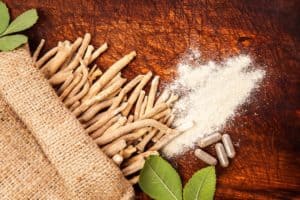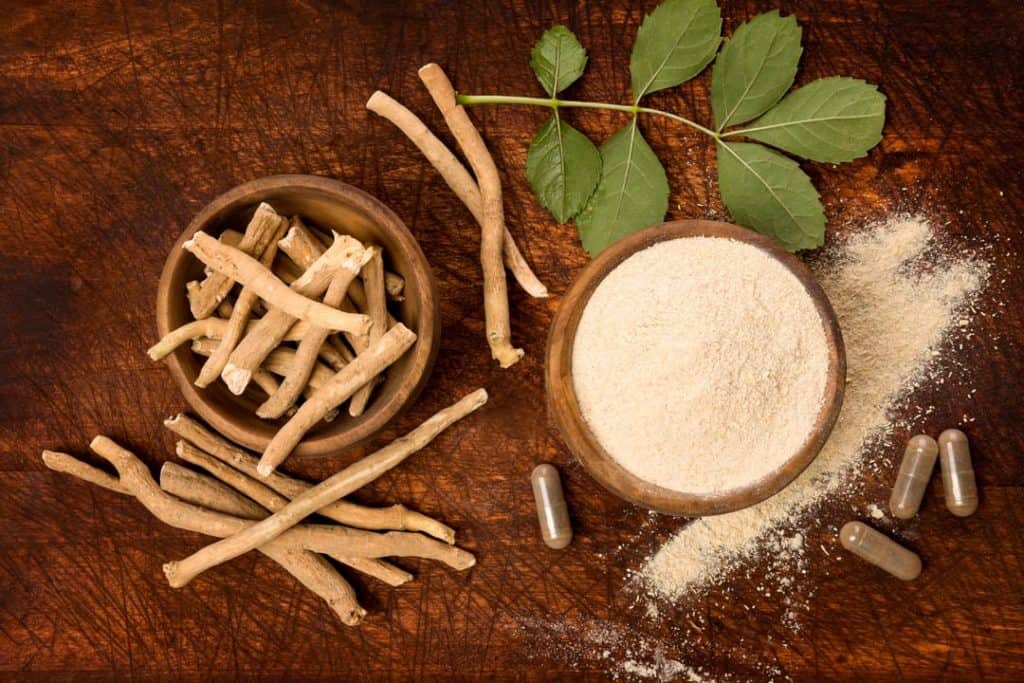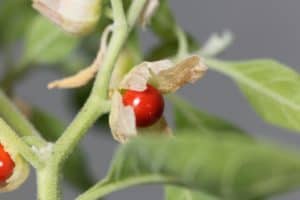What is Ashwagandha?
The root of the ashwagandha plant has long been used in African societies to treat a number of health problems. It is derived directly from the ashwagandha plant’s berries and roots. The aroma is a strong one, but the really impressive part is how this medicinal herb can reduce cortisol levels and boost brain function.
What Other Names in Ashwagandha Known By?
A traditional African medicine, this plant-based treatment is often referred to as “Indian Ginseng.” It is also known as poison gooseberry and winter cherry. In Sanskrit, ashwagandha directly translates to the “smell of the horse.
Where is Ashwagandha Sourced From?
This small shrub produces its incredible medicinal berries and roots in India and North Africa – where they have long been known and appreciated for their enormous health benefits. You may not be able to grow your own in North America, but supplements containing powdered ashwagandha are readily available here.
What is Ashwagandha Used For?
 This is probably the most loaded question one could ask when it comes to this valuable medicinal herb. The list of ailments that may be treated or improved through the use of ashwagandha is a long one. According to WebMD, ashwagandha may be used to treat anxiety and stress, minor skin conditions, inflammation, ADHD, OCD, schizophrenia, Parkinson’s, chronic liver disease, male infertility, swelling, tumors, tuberculosis, and fibromyalgia. It may also be used for less complicated conditions, like insomnia or menstrual symptoms.
This is probably the most loaded question one could ask when it comes to this valuable medicinal herb. The list of ailments that may be treated or improved through the use of ashwagandha is a long one. According to WebMD, ashwagandha may be used to treat anxiety and stress, minor skin conditions, inflammation, ADHD, OCD, schizophrenia, Parkinson’s, chronic liver disease, male infertility, swelling, tumors, tuberculosis, and fibromyalgia. It may also be used for less complicated conditions, like insomnia or menstrual symptoms.
Ashwagandha for Anxiety and Stress
Commonly used to treat both anxiety disorders stress, ashwagandha may be the answer you’ve been looking for. Ashwagandha is known as an adaptogen, meaning it can help the body adapt to stressful conditions. This natural medicinal herb has also long been speculated as a treatment for anxiety disorders, as well. By lowering blood sugar levels and cortisol levels, ashwagandha can help the body counteract the symptoms of anxiety and/or depression.
Ashwagandha for Weight Loss
Patients suffering from chronic stress are much more likely to suffer from obesity than other individuals. Ashwagandha, according to the NCBI, was proven to significantly help patients lose weight during a recent study. The double-blind, randomized study noted significant improvements in patients seeking to lose weight with ashwagandha compared to patients given a placebo. The study also determined the medicinal herb was both safe and tolerable.
Ashwagandha for Sleep and Insomnia Trouble
According to the NCBI, the active ingredient in ashwagandha is triethylene glycol – a component known to induce sleep. If you are suffering from chronic insomnia and are not willing to take on the risk of prescription drugs, you may want to consider the all-natural medicinal herb that generations of Indian and African people have turned to for the last 3,000 years.
In addition to inducing sleep in the sleep-deprived, ashwagandha doesn’t carry the disastrous risk factors carried by strong prescription drugs and behind-the-counter sleep aids.
Ashwagandha and Male Infertility
Ashwagandha has long been used in Indian and African cultures to cure infertility in men. The truth is, ashwagandha boosts testosterone. This, in turn, helps to produce more healthy sperm.
Ashwagandha and Your Heart
You may not think an all-natural herb can treat heart disease, but it actually can. More specifically, ashwagandha can lower both cholesterol and triglycerides, significantly improving heart health.
Ashwagandha and ADHD
In preliminary tests, ashwagandha shows promising signs of the ability to help improve impulse control in young children suffering from ADHD. Many parents are very fearful of giving their children prescription medications to deal with their ADHD symptoms – and rightfully so! This natural medicinal herb just may be the option your child needs.
Ashwagandha and Osteoarthritis
 When combined with turmeric, zinc, and guggul, it has been shown to bring significant improvement to patients suffering from the pain of osteoarthritis. Using ashwagandha alone to treat osteoarthritis may also work but has not yet been adequately studied for effectiveness on its own.
When combined with turmeric, zinc, and guggul, it has been shown to bring significant improvement to patients suffering from the pain of osteoarthritis. Using ashwagandha alone to treat osteoarthritis may also work but has not yet been adequately studied for effectiveness on its own.
Ashwagandha and Anti-Cancer Properties
This long-used medicinal herb has recently been linked to anti-cancerous properties. This herb can help promote apoptosis, which is the mechanism that kills cancer cells and prevents the growth of new ones. In combination with anti-cancer treatments, ashwagandha has shown the ability to reduce tumor growth by as much as 80% in initial lab tests on rats.
Ashwagandha and Diabetes
If you have diabetes, beware of ashwagandha use. This herb is known to reduce blood sugar levels. While this can be beneficial in treating some health conditions, it may be a danger to those who have diabetes. Before trying ashwagandha, be sure to speak with your health care provider as you may not be a good candidate for this herb.
Ashwagandha Dosage
Because the study of ashwagandha is still relatively recent, there are no definitive rules for dosing of the supplement in place yet. It is recommended to follow the care label for dosing instructions and meet with your health care practitioner. Discussing the dosage options with your healthcare provider will help you both outline a dosage that works best for you. Factors like your age, weight, and health status will play a role in determining the appropriate dosage for you.
Common Ashwagandha Supplements
Because the ashwagandha plant isn’t readily available in North America, you may want to consider a supplement, but which one? With so many medicinal herb supplements on the market, it may be difficult to choose one. In general, stick to a product that does not contain any other substances or ingredients. You can find ashwagandha in a pill form or powder form. Whichever you choose, be sure there are no other medications added to the mix.
Ashwagandha Root Powder

Extracted directly from the root and leaves of the plant, ashwagandha powder is a safe alternative to many medications and drugs. Before taking it, be sure to read the label for dosing instructions according to your age, weight, and general health.
Ashwagandha Pills
The pill form is basically the same as the powder. For some patients, swallowing a pill is the easiest way to go. In which case, the ashwagandha pill supplement is for you. But if you find the capsule to difficult to swallow, you can always opt for the powder instead.
Other Ashwagandha Supplements
When it comes to selecting an ashwagandha supplement, be sure to go for the one that doesn’t include a mix of other herbs or supplements. In fact, you may also want to consider trying organic ashwagandha instead.
Possible Side Effects of Ashwagandha
There is very little out there that comes completely risk-free, but ashwagandha is about as close as it gets. Some side effects may include lower blood sugar levels, a change in blood pressure, stomach ulcers, thyroid conditions, or autoimmune disorders. Thankfully, NCBI studies, so far, have indicated the medicinal herb is not only tolerable for most adults, but also safe. The above-mentioned side effects are quite rare, with most users reporting no side effects at all.
Will My Current Medications Interact with Ashwagandha?
If you take autoimmune disorder medications, there is a chance you may have an adverse reaction to taking ashwagandha. Before you add this medicinal herb into your daily regimen, be sure to check with both your physician and your pharmacist to be sure you are a good candidate for taking the supplement. Benzodiazepines and some medications for depression may also interact with ashwagandha supplements.
Is Ashwagandha Safe?
In most studies, ashwagandha has been proven safe and tolerable by major health organizations in North America for individuals who are in good health and do not have any underlying health conditions. That being said, it is always in your best interest to meet with your health care practitioner before adding any new supplements or medicinal herbs to your diet.
Based on your current health and medications you take, your health care provider will be able to help you decide whether or not you can safely integrate ashwagandha into your daily regimen and at what dose.
It is important, however, to note that although ashwagandha is safe, it has not yet been proven to be effective as a treatment option for some of the above-mentioned health conditions. However, initial clinical research looks promising, and the use of this medicinal herb is generally harmless for most healthy individuals.
Possible Health Care Warnings
Though research is still being conducted, there are a select few groups of individuals who are urged to avoid ashwagandha. For instance, diabetes patients, as previously mentioned.
Pregnant or Nursing Mothers
If you are pregnant or breastfeeding, the use of ashwagandha is not recommended. Not because it is unsafe, but because there is yet to be conclusive data to confirm its safety for a woman, her unborn baby, or her nursing child. Inadequate research and data to date is the only reason for this warning. To be safe, always check with your healthcare provider and your baby’s pediatrician before introducing anything new into your body if you are pregnant or breastfeeding.
Individuals With High or Low Blood Pressure
As ashwagandha can affect your blood pressure, if you already suffer from high or low blood pressure, it may be best for you to avoid ashwagandha. If you do try it anyway, be sure to test your blood pressure regularly and be sure you are being followed by a licensed health care practitioner.
Individuals With Autoimmune Diseases
In some cases, the use of ashwagandha may actually increase the negative symptoms of your autoimmune disease. In addition, it may also interfere with your autoimmune disease medications. To be safe, it is best to avoid this natural supplement.
Individuals With Thyroid Disorders
Ashwagandha may increase thyroid hormone levels. For anyone with a thyroid disorder, this side effect may not be one you can afford to suffer. To be sure you do not throw off the careful balance of your thyroid regulating medication, speak with your doctor, or avoid ashwagandha altogether.
How Do I Know if Ashwagandha Is Right For Me?
As with any natural supplements or medication, you can and should consult with your healthcare practitioner first. For your own safety, being followed by a licensed practitioner is highly recommended – whether you take any new supplements or not.
If you do not have a healthcare practitioner, get a referral for one, or meet with your local pharmacist to get more information. Find out if you can take advantage of the numerous health benefits of all-natural ashwagandha root extract!










